- Home
- Stephen R. Donaldson
The Illearth War Page 35
The Illearth War Read online
Page 35
Cursing in dismay, Troy turned to see what had happened.
Lord Callindrill was on the ground near the wall. Several badly wounded warriors had fallen from their mounts within yards of the blue fire, and Callindrill was trying to help them. Rapidly he tore their clothing into strips, made tourniquets and bandages.
He did not look up to see his danger.
Already the ur-viles were preparing to fight the wall. They sent most of the riderless kresh running to pass around the ends of the fire. Three ur-vile wedges moved forward to attack. The rest retreated a short distance and began re-forming themselves into a huge, single wedge.
Troy kicked Mehryl into a gallop, and joined the Bloodguard following Mhoram and Verement.
Lord Mhoram was twenty yards ahead of Troy, but he could not reach Callindrill in time. The three ur-vile wedges near the fire attacked. They did not try to break the Lords’ wall. Instead the loremasters concentrated all their power in one place. With a harsh clang, they struck their iron staves together. A great spew of liquid force gushed from the impact, splashed into the forbidding fire, and passed through it.
In black, burning gouts, the corrosive fluid dropped toward Callindrill. It fell just short of him, did not touch him. But it hit the ground with a concussion that flung him and the injured warriors into the air like limp bundles.
When they flopped down again, they lay still.
At once, the three wedges hurried aside, and the new, single, massed wedge started lumbering toward the wall.
Simultaneously the first kresh rounded both ends of the fire.
The next instant, Lord Mhoram threw himself from his Ranyhyn’s back, landed beside Callindrill. A quick glance told him that the warriors were dead; the force of the concussion had killed them. He concentrated on Callindrill. Touching the Lord’s chest with his hands, he confirmed what his eyes told him; life still flickered in Callindrill, but his heart was not beating.
Then Troy reached Mhoram’s side, and the Bloodguard poised themselves to defend the Lords. On horseback, Verement worked at the wall of forbidding, tightened it against the assault of the wedge. But it could not withstand fifteen hundred ur-viles. The wedge moved slowly, but it was hardly twenty yards from the fire. And kresh poured around the ends of the wall now, pelting toward the Bloodguard and Lords. The Bloodguard moved out to meet the wolves, but a hundred Bloodguard could not hold back five thousand kresh for long.
“Flee!” Mhoram yelled. “Go! Save yourselves! We must not all die here!”
But he did not wait to observe that no one obeyed him. Instead he bent over the fallen Lord again. Holding his lower lip in his teeth, he massaged Callindrill’s chest, honing to renew his pulse. But his heart remained motionless.
Mhoram drew a sudden sharp breath, raised his fist, and hammered once with all his might on Callindrill’s chest.
The blow jolted the Lord’s heart. It lurched, stumbled, then broke into a limping beat.
Mhoram shouted for Morril. At once, the Bloodguard leaped down from his Ranyhyn, caught Callindrill in his arms, and sprang up again. Seeing this, Lord Verement broke away from the forbidding wall, started back toward Doom’s Retreat. Mhoram and Troy mounted, surged away from the wall after him.
The Bloodguard followed in a protective ring around the Lords.
A moment later, the massed ur-vile wedge hit the wall and tore it. Dark, liquid power shredded the blue flame, ripped it into fragments and scattered it. Instantly the rest of the kresh flooded after the escaping Ranyhyn. And the wolves pouring around the ends of the wall changed direction to intercept the riders.
But the Ranyhyn outdistanced them. The great horses of Ra pulled past Verement and thundered toward Doom’s Retreat.
Ahead under the late afternoon shadow of the cliffs, Hiltmark Quaan was urging the last of his warriors into the canyon.
Maddened by the escape of so many prey, the kresh howled with rage, and swung to converge on Lord Verement.
His mustang ran hard and bravely. But it was already exhausted; slowly the kresh gained on it. Before it had covered half the distance to the Retreat, Troy could see that it would lose the race.
He called for help, but the Bloodguard did not respond. Only Thomin, the Bloodguard personally responsible for Verement, remained behind. Incensed Troy started to go back himself, but Mhoram stopped him by shouting, “There is no need!”
Thomin waited until the last possible moment—until the kresh were raging at the heels of the mustang. Then he pulled the Lord onto his own Ranyhyn, and carried him away toward the Retreat.
Almost at once, the mustang fell screaming under an avalanche of wolves.
For an instant, the haze of the cliff shadow turned sickly red in Troy’s sight. But then Mehryl’s taut run bore him beyond the scream, took him straight toward the gap in the cliffs. He flashed into the deeper gloom of the defile. Except for the slit of light ahead, he could see nothing. The sharp change made him feel that he was foundering. The rumble of hooves pounded back at him from the cliffs, and behind the echo came the shrill croaking derision of the ravens. He felt waters of darkness closing over his head. When he broke out the end of the Retreat into the dim, late light of day, he was almost dazzled with relief.
As he passed, First Haft Amorine gave a piercing shout, and thousands of warriors dashed away from the cliffs on either side of the gap. Despite the long fatigue which radiated from them, they ran with precision, took positions, formed an arc over the end of the canyon, sealing the trap.
Moments later, the first kresh came howling out of the Retreat and sprang at them. The whole arc of warriors staggered under the shock of impact. But Amorine had eighteen Eoward and braced to meet the onslaught. The arc gave ground but did not break.
With an effort, Troy brought himself under control. Over to one side, he could hear Lord Verement barking, “Release me! Am I a child, that I must be carried?” Troy grinned grimly, then drew Mehryl up behind the arc so that he would be ready to help his warriors if the wolves outweighed them. He ached to see the outcome of the trap, but the darkness of the Retreat foiled his sight.
Soon, however, he could hear the sounds of combat echoing out of the defile. Over the noise of the embattled arc, he made out a sudden raw howl as the kresh in the Retreat found themselves attacked from above by twenty Eoward hidden in the canyon walls. At first, the howl contained surprise and ferocity, but no fear; the wolves did not understand their danger.
The ur-viles were wiser. Their commands cut stridently through the rage of the wolves. And soon the howling changed. To their dismay, the kresh began to understand the glee of the ravens. And the yammering of the ur-viles became fiercer, more desperate. In the narrow defile, they could not make effective use of their fighting wedges, and without that focus of power, they were vulnerable to arrows and spears and rockfalls. Caught in a seething, confused mass of wolves, the wedges began to collapse.
As the wedges crumbled, fear and uncertainty penetrated the wolves’ fury for blood. In tattered bunches, the kresh broke away, tried to flee through the canyon. But the cramped panic of their numbers only hampered them, and made the ur-viles more vulnerable. And death rained down on them through the jeering of the ravens. In mad frenzy, wild to fight an enemy they could not reach, the kresh started to attack the ur-viles.
No wolves or ur-viles escaped. When the battle was done, the entire vanguard of Fleshharrower’s army lay dead in Doom’s Retreat.
For one moment, a hush fell over the battleground; even the ravens were silent. Then a hoarse cheer came echoing from the canyon. The Eoward sealing the end of the Retreat responded loudly. And the ravens began sailing down to the defile’s floor, where they feasted on Demondim-spawn and kresh.
Slowly Troy became aware that First Haft Amorine was at his side. When he turned to her, he felt that he was grinning insanely, but even without his sunglasses he did not care. “Congratulations, Amorine,” he said. “You’ve done well.” The evening fog on his sight was already so ba
d that he had to ask her about casualties.
“We have lost few warriors,” she replied with dour satisfaction. “Your battle plan is a good one.”
But her praise only reminded him of the rest of Lord Foul’s army, and of the ordeal still before the Warward. He shook his head. “Not good enough.” But then, rather than explain what he meant, he said to her, “First Haft, give my thanks to the warriors. Get them fed and settled for the night—there won’t be any more fighting today. When they’re taken care of, we’ll have a council.”
Amorine’s gaze showed that she did not understand his attitude, but she saluted without question, and moved away to carry out his orders. His blank mist swallowed her at once. Darkness blew about him as if it rode on the wind of the Warward’s shouting. He called for Ruel, and asked the Bloodguard to guide him to Lord Mhoram.
They found Mhoram beside a small campfire under the lee of the westward mountains. He was tending Lord Callindrill. Callindrill had regained consciousness, but his skin was as pale as alabaster, and he looked weak. Mhoram cooked some broth over the campfire, and massaged Callindrill while the broth heated.
Lord Callindrill greeted the Warmark faintly, and Troy replied with pleasure. He was glad to see that Callindrill was not mortally injured; he was going to need the Lord. He was going to need every help or power that he could find.
But he had other things to consider before he began to think about his need for help. When he had assured himself that Lord Callindrill was on the way to recovery, he drew Mhoram away for a private talk.
He waited until they were beyond earshot of the Warward’s camp. Then he sighed wearily, “Mhoram, we’re not finished. We can’t stop here.” Without transition, as if he had not changed subjects, he went on, “What are we going to do about Lord Verement? One of us has got to tell him—about Shetra. I’ll do it if you want. I probably deserve it.”
“I will do it,” Mhoram murmured distantly.
“All right.” Troy felt acutely relieved to be free of that responsibility. “Now, what about this—what Tull told us? I don’t like the idea of telling everyone that—that the mission—” He could not bring himself to say the words, The Giants are dead. “I don’t think the warriors will survive what’s ahead if they know what happened to the mission. It’s too much. Having three Giants taken over by Ravers is bad enough. And I’ll have to tell them worse things than that myself.”
Softly Mhoram breathed, “They deserve to know the truth.”
“Deserve?” Troy’s deep feeling of culpability flooded into anger. “What they deserve is victory. By God, don’t tell me what they deserve! It’s a little late for you to start worrying about what they know or don’t know. You’ve seen fit to keep secrets from me all along. God knows how many horrors you still haven’t told me. Keep your mouth shut about this.”
“That choice was made by the Council. No one person has the right to withhold knowledge from another. No one is wise enough.” Mhoram spoke as if he were wrestling with himself.
“It’s too late for that. If you want to talk about rights—you don’t have the right to destroy my army.”
“My friend, have you—have you suffered—has the withholding of knowledge harmed you?”
“How should I know? Maybe if you had told me the truth—about Atiaran—we wouldn’t be here now. Maybe I would have been afraid of the risk. You tell me if that’s good or bad.” Then his anger softened. “Mhoram,” he pleaded, “they’re right on the edge. I’ve already pushed them right to the edge. And we’re not done. I just want to spare them something that will hurt so bad—”
“Very well,” Mhoram sighed in a tone of defeat. “I will not speak of the Giants.”
“Thank you,” Troy said intensely.
Mhoram gazed at him searchingly, but through his darkness he could not read the Lord’s expression. For a moment, he feared that Mhoram was about to tell him something, reveal the last mysteries of Trell and Elena and Covenant. He did not want to hear such things—not now, when he was already so overburdened. But finally the Lord turned silently and started back toward Callindrill.
Troy followed him. But on the way he paused to speak with Terrel, who was the ranking Bloodguard. “Terrel, I want you to send scouts out to the South Plains. I don’t expect Foul’s army before midday tomorrow, but we shouldn’t take any chances—and the warriors are too tired. But there’s one thing. If Foul or Fleshharrower or whoever is in command sends any scouts this way, make sure they know we’re here. I don’t want them to have any doubt about where to find us.”
“Yes, Warmark,” Terrel said, and stepped away to make the arrangements. Troy and Mhoram went on to their campfire.
They found Lord Verement feeding Callindrill. As he spooned the broth to Callindrill’s lips, the hawk-faced Lord talked steadily in a low, exasperated tone, as if his pride were offended; but his movements were gentle, and he did not abandon the task to Mhoram. He hovered over Callindrill until the warm broth had restored a touch of color to his pale cheeks. Then Verement stood up and rasped, “You would be less foolhardy were you not Ranyhyn-borne. A lesser mount would teach you the limits of your own strength.”
This inverted repetition of Verement’s old accusation against himself momentarily overcame Lord Mhoram. A moan escaped through his teeth, and his eyes filled with tears. For that moment, his courage seemed to fail him, and he reached toward Verement as if he were groping through blind grief. But then he caught himself, smiled crookedly at the rough look of surprise and concern on Verement’s face. “Come, my brother,” he murmured. “I must speak with you.” Together, they walked away into the night, leaving Troy to watch over Callindrill.
In a wan voice, Callindrill asked, “What has happened? What disturbs Mhoram?”
Sighing heavily, Troy seated himself beside the Lord. He was full of all the evil he had caused. He had to swallow several times before he could find his voice to say, “Runnik came back from Korik’s mission. Lord Shetra died in the Sarangrave.”
Then he was grateful that Callindrill did not speak. He did not think he could stand the reprimand of any more pain. They sat together in silence until Lord Mhoram returned alone.
Mhoram carried himself sorely, as if he had just been beaten with clubs. The flesh around his eyes was red and swollen, sorrowful. But his eyes themselves wielded a hot peril, and his glances were like spears. He said nothing about Lord Verement. Words were unnecessary; Mhoram’s expression revealed how Verement took the news of his wife’s death.
To steady himself, Mhoram set about preparing food for Troy and himself. Their meal passed under a shroud of gloom, but as he ate Lord Mhoram slowly mastered himself, relaxed the pain in his face. To match him, Warmark Troy grappled inwardly for the tone of confidence he would need when the council started. He did not want his doubt to show; he did not intend to make his army pay for his personal dilemmas and inadequacies. When Hiltmark Quaan approached the fire and announced that all the Hafts were ready, both Troy and Mhoram answered him resolutely, calmly.
The Lord threw a large pile of wood onto the fire while Quaan brought his officers into a wide circle around it. But despite the bright blaze of the fire, the Hafts looked hazy and insubstantial to Troy. For an irrational instant, he feared that they would break into illusions and disappear when he told them what they had to do. But he braced himself. Hiltmark Quaan and First Haft Amorine stood near him like pillars on one side, and Lord Mhoram watched him from the other. Clearing his throat, he opened the council.
“Well, we’re here. In spite of everything, we’ve accomplished something that any of us would have said was impossible. Before we get into what’s ahead, I want to thank you all for what you’ve done. I’m proud of you—more than I’ll ever be able to say.”
As he spoke, he had to resist a temptation to duck his head, as if he were ashamed of his uncovered eyelessness. Painfully he wondered what effect this view of him would have on the Hafts. But he forced himself to hold his head up as he continu
ed. “But I have to tell you plainly—we haven’t come near winning this war yet. We’ve made a good start, but it’s only a start. Things are going to get worse—” He lost his voice for a moment, and had to clench himself to recover it. “It’s not going to work out the way I planned. Hiltmark Quaan—First Haft Amorine—you’ve done everything you could do—everything I asked. But it’s not going to work out the way I told you it would.
“But—first things first. We’ve got reports to make. Hiltmark, will you go first?”
Quaan bowed, and stepped forward into the circle. His square, white-haired visage was streaked with grime and blood and fatigue, but his open gaze did not falter. In blunt, unaffected language, he described all that had happened to his command since he had left Revelstone—the raft ride and run to the Mithil valley, the blockade there, the progression of the battle as Fleshharrower, the corrupted Giant of whom Manethrall Rue had spoken, organized successive efforts to break the hold of the defenders. For five days, the Bloodguard, the warriors, and the two Lords withstood Cavewights, kresh, warped manlike creations of the Illearth Stone, ur-viles.
“But on the sixth day,” Quaan continued, “Fleshharrower came against us himself.” Now his voice expressed the weariness of long fighting and lost warriors. “With a power that I do not name, he called a great storm against us. Abominable creatures like those of which Manethrall Rue spoke fell upon us from the sky. They cast fear among our mounts, and we were driven back. Then Fleshharrower broke the forbidding, and sent kresh and ur-viles to pursue us. Time and again, we turned to fight, so that the enemy might be delayed—and time and again we were overmastered. Often we sent riders ahead to bear warning, but every messenger was slain—flocks of savage cormorants assailed them from the sky, and destroyed them all, though some of them were Bloodguard.
“Still we fought,” he concluded. “At last we are here. But half the Bloodguard and eight of the Eoward were slain. And the horses have passed the end of their strength. Many will never bear riders again, and all need long days of rest. The battle which remains must be met afoot.”

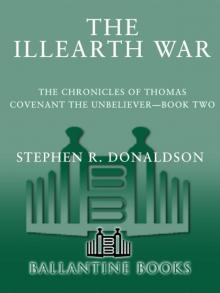 The Illearth War
The Illearth War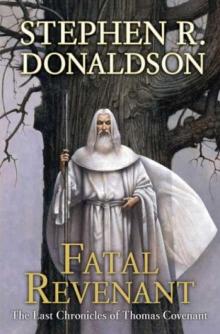 Last Chronicles of Thomas Covenant 02 - Fatal Revenant
Last Chronicles of Thomas Covenant 02 - Fatal Revenant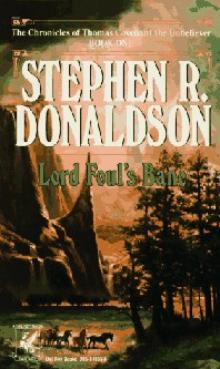 Lord Foul's Bane
Lord Foul's Bane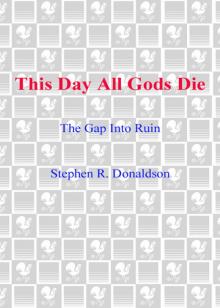 The Gap Into Ruin: This Day All Gods Die
The Gap Into Ruin: This Day All Gods Die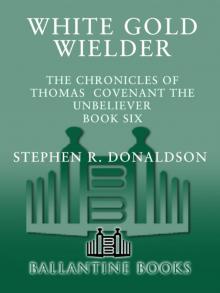 White Gold Wielder
White Gold Wielder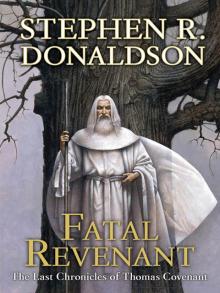 Fatal Revenant
Fatal Revenant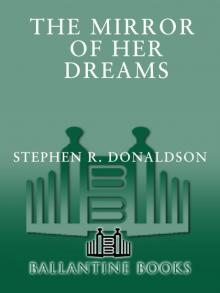 The Mirror of Her Dreams
The Mirror of Her Dreams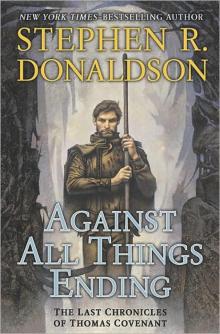 Against All Things Ending
Against All Things Ending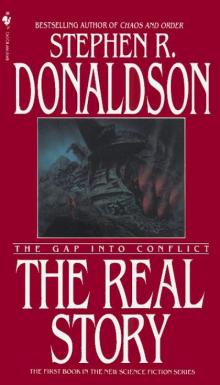 The Real Story: The Gap Into Conflict
The Real Story: The Gap Into Conflict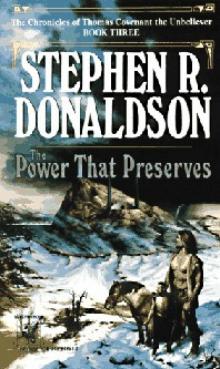 The Power That Preserves
The Power That Preserves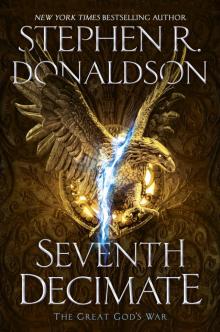 Seventh Decimate
Seventh Decimate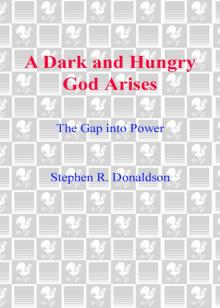 The Gap Into Power: A Dark and Hungry God Arises
The Gap Into Power: A Dark and Hungry God Arises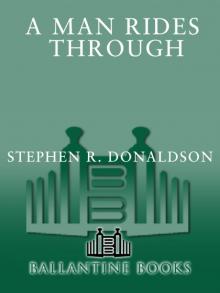 A Man Rides Through
A Man Rides Through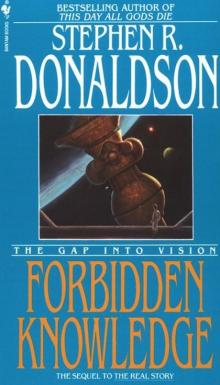 The Gap Into Vision: Forbidden Knowledge
The Gap Into Vision: Forbidden Knowledge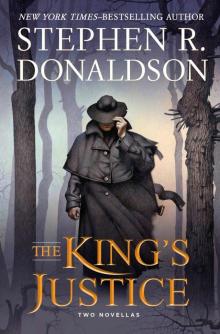 The King's Justice: Two Novellas
The King's Justice: Two Novellas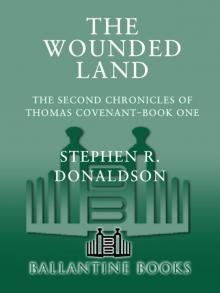 The Wounded Land
The Wounded Land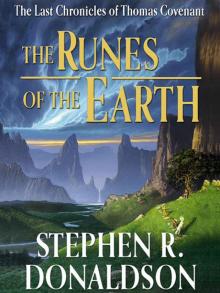 The Runes of the Earth
The Runes of the Earth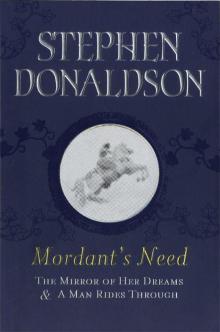 Mordant's Need
Mordant's Need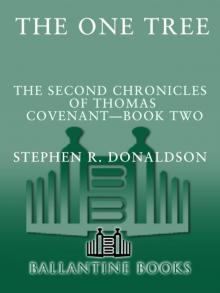 The One Tree
The One Tree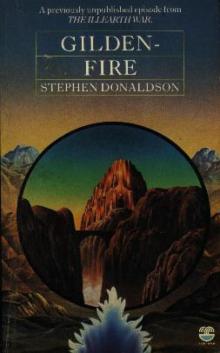 Gilden-Fire
Gilden-Fire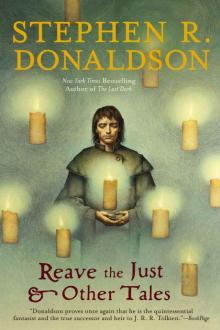 Reave the Just and Other Tales
Reave the Just and Other Tales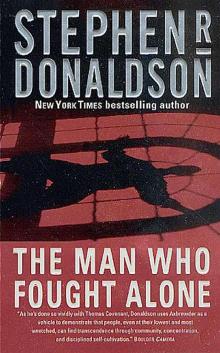 The Man Who Fought Alone
The Man Who Fought Alone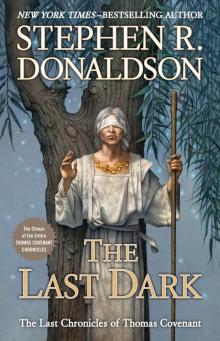 The Last Dark
The Last Dark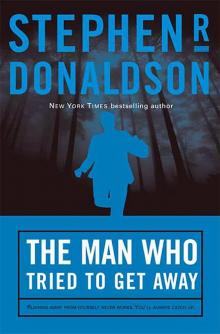 The Man Who Tried to Get Away
The Man Who Tried to Get Away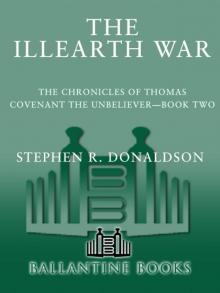 Thomas Covenant 02: The Illearth War
Thomas Covenant 02: The Illearth War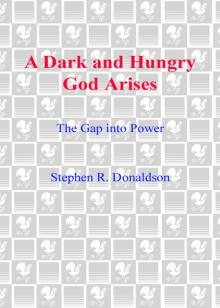 A Dark and Hungry God Arises
A Dark and Hungry God Arises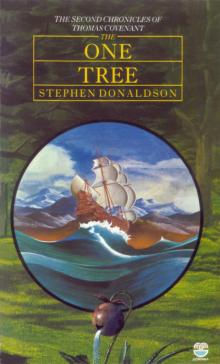 The One Tree t2cotc-2
The One Tree t2cotc-2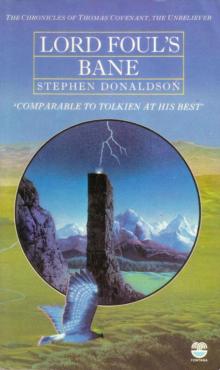 Lord Foul's Bane cotc-1
Lord Foul's Bane cotc-1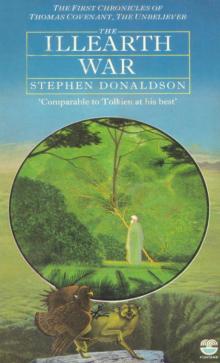 The Illearth War t1cotc-2
The Illearth War t1cotc-2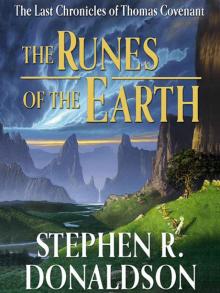 The Runes of the Earth: The Last Chronicles of Thomas Covenant - Book One
The Runes of the Earth: The Last Chronicles of Thomas Covenant - Book One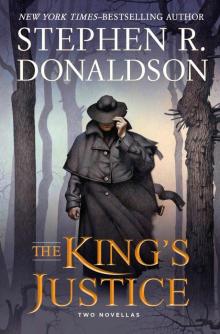 The King's Justice
The King's Justice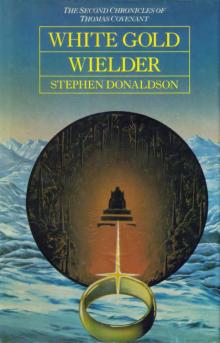 White Gold Wielder t2cotc-3
White Gold Wielder t2cotc-3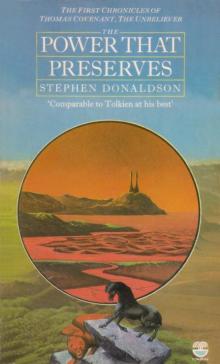 The Power That Preserves t1cotc-3
The Power That Preserves t1cotc-3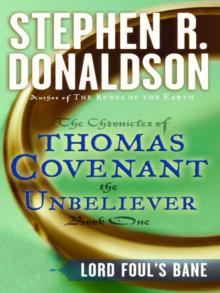 Thomas Covenant 01: Lord Foul's Bane
Thomas Covenant 01: Lord Foul's Bane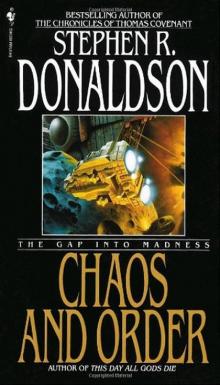 Chaos and Order: The Gap Into Madness
Chaos and Order: The Gap Into Madness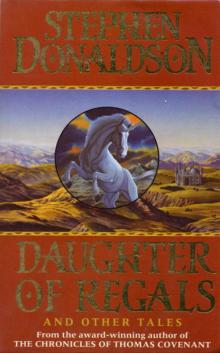 Daughter of Regals
Daughter of Regals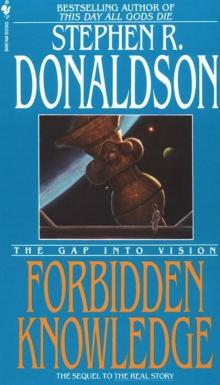 Forbidden Knowledge: The Gap Into Vision
Forbidden Knowledge: The Gap Into Vision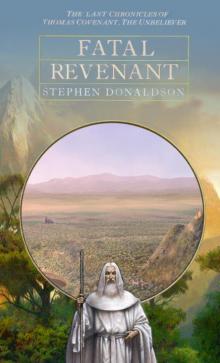 Fatal Revenant t3cotc-2
Fatal Revenant t3cotc-2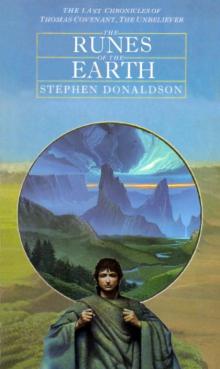 The Runes of the Earth t3cotc-1
The Runes of the Earth t3cotc-1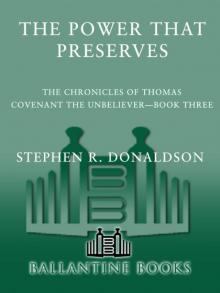 Thomas Covenant 03: Power That Preserves
Thomas Covenant 03: Power That Preserves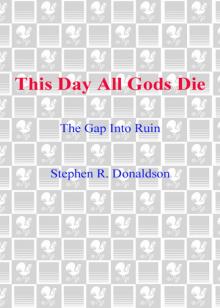 This Day all Gods Die: The Gap into Ruin
This Day all Gods Die: The Gap into Ruin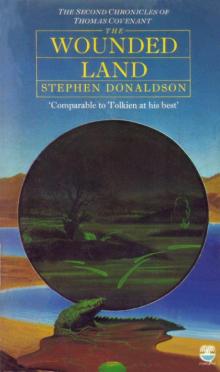 The Wounded Land t2cotc-1
The Wounded Land t2cotc-1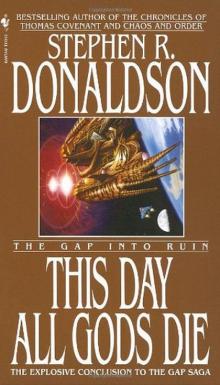 This Day All Gods Die
This Day All Gods Die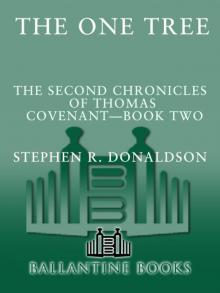 One Tree
One Tree